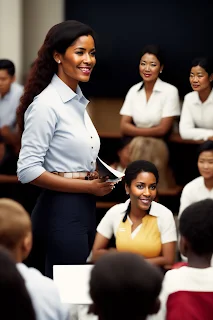The role of education and awareness-raising in promoting women's empowerment
Education and awareness-raising play a critical role in promoting women's empowerment. By educating individuals and raising awareness about the issues and challenges faced by women, we can challenge gender-based discrimination and biases, promote gender equity, and support women's leadership and participation in all areas of society. In this essay, we will explore the role of education and awareness-raising in promoting women's empowerment, and how these tools can be used to create a more equitable and inclusive society.
Education is a powerful tool for promoting women's empowerment. Education can provide women with the knowledge, skills, and confidence they need to participate fully in all areas of society. Education can also help to challenge gender-based discrimination and biases, by promoting gender equity and providing opportunities for women to challenge societal norms and expectations.
Education can also help to promote women's leadership development. By providing women with leadership training and opportunities, education can help to build their confidence and provide them with the skills and knowledge they need to take on leadership roles in their communities and workplaces.
In addition to formal education, informal education, and awareness-raising efforts can also play an important role in promoting women's empowerment. Informal education can take many forms, such as community-based education programs, workshops, and awareness-raising campaigns.
Awareness-raising campaigns are a powerful tool for promoting women's empowerment. By raising awareness about the issues and challenges faced by women, these campaigns can help to challenge gender-based discrimination and biases, promote gender equity, and support women's leadership and participation in all areas of society.
Awareness-raising campaigns can take many forms, such as social media campaigns, community events, and public awareness campaigns. These campaigns can focus on a range of issues, such as violence against women, gender-based discrimination, and women's leadership development.
To promote women's empowerment through education and awareness-raising, it is important to address the unique challenges and barriers faced by women. These challenges and barriers may include a lack of access to education, cultural norms and expectations, and gender-based discrimination and biases.
To address these challenges and barriers, education and awareness-raising efforts should focus on the following strategies:
1. Providing access to education: Access to education is critical for promoting women's empowerment. Efforts should be made to ensure that women have equal access to education and training opportunities, regardless of their socioeconomic background, cultural or ethnic identity, or geographic location.
2. Challenging gender-based norms and expectations: Gender-based norms and expectations can limit women's opportunities and perpetuate gender-based discrimination and biases. Education and awareness-raising efforts should focus on challenging these norms and expectations, by promoting gender equity and providing opportunities for women to challenge societal norms and expectations.
3. Addressing gender-based violence: Gender-based violence is a significant barrier to women's empowerment. Education and awareness-raising efforts should focus on addressing gender-based violence, by promoting awareness of the issue, providing support and resources to survivors of violence, and advocating for policies and initiatives to prevent violence against women.
4. Supporting women's leadership development: Leadership development is critical for promoting women's empowerment. Education and awareness-raising efforts should focus on providing women with leadership training and opportunities and supporting women to take on leadership roles in their communities and workplaces.
5. Engaging men and boys: Men and boys can play an important role in promoting women's empowerment. Education and awareness-raising efforts should focus on engaging men and boys, by promoting awareness of the issues and challenges faced by women and encouraging men and boys to support gender equity and women's leadership development.
In conclusion, education and awareness-raising are critical tools for promoting women's empowerment. By providing women with access to education and training opportunities, challenging gender-based norms and expectations, addressing gender-based violence, supporting women's leadership development, and engaging men and boys in these efforts, we can promote gender equity and create a more equitable and inclusive society for all. Efforts to promote women's empowerment through education and awareness-raising should be holistic and intersectional, taking into account the unique challenges and barriers faced by women from different socio-economic backgrounds, cultural or ethnic identities, and geographic locations.
In addition to the strategies outlined above, it is important to recognize that education and awareness-raising efforts should be ongoing and sustained. Creating lasting change requires a long-term commitment to promoting women's empowerment, and efforts should be made to ensure that education and awareness-raising efforts are integrated into broader social and political initiatives aimed at promoting gender equity.
Overall, education and awareness-raising are powerful tools for promoting women's empowerment. By providing women with the knowledge, skills, and confidence they need to participate fully in all areas of society, and by raising awareness about the issues and challenges faced by women, we can challenge gender-based discrimination and biases, promote gender equity, and support women's leadership and participation in all areas of society.

